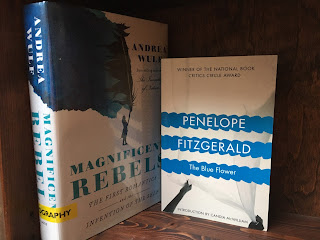"Listen, this good old Jena really is a den of murderers after all. You have no idea how everyone gossips about everything behind your back, even the people you wouldn't expect."
-Letter from Caroline Schlegel to her husband August Wilhelm Schlegel, 5 May 1801
But they're people worth gossiping about, with Goethe the best known. He's the old man of the group, 46 at the start, respectable, though not entirely, since he's living with, and not yet married to, Christiane Vulpius. There's a boatload of Friedrichs, and Wulf conveniently provides a Dramatis Personae, because among those Friedrichs are Schiller, Schlegel, and Schelling, plus one (Friedrich von Hardenberg) whose name fortunately doesn't start with 'Sch', and better known as Novalis anyway. Poets, translators, philosophers. Kant is an early booster, and Hegel a late addition to the group.
At first there's harmony. They start magazines, philosophize together, read each other's poetry. Goethe and Schiller edit each other's work. Goethe arranges for Johann Fichte a job as professor at Jena; his lectures become enormously popular. Later Goethe is equally instrumental in getting Friedrich Schelling an appointment as a professor of philosophy. It's Friedrich Schlegel who popularizes the word Romantic in its modern sense, from the French word 'roman', meaning a novel.
Wulf is most interested in Caroline Schlegel. (Her name through most of the book. At the start she's the widow Böhmer; near the end, after a long affair with him, she marries Schelling.) August Wilhelm Schlegel is her second husband, and the two of them are responsible for what Wulf says are still the standard translations of Shakespeare in German. But the affairs, the literary feuds, the short tempers, begin to tell. Fichte is fired from his professorship for atheism. The Schlegels and Schiller end up in a bitter feud over editing and won't talk to each other, though Goethe attempts to mediate. By 1806, the year of the Battle of Jena, where Napoleon decimates the army of Prussia and its allies, most of the principals have already left town. The town itself is battered. But their legacy lives on, propagated by figures who write books about them, such as Madame de Staël and Samuel Taylor Coleridge.
A pretty fascinating crowd in its own right, but especially fascinating if you're a fan of Penelope Fitzgerald's delightful The Blue Flower.
"Novels arise out of the shortcomings of history."
"...What did they talk about?""Nature-magnetism, galvanism, animal magnetism and freemasonry."
"I see the fault in Fichte's system. There is no place in it for love."
"If a story begins with finding, it must end with searching."
"But I have, I can't deny it, a certain inexpressible sense of immortality."
All sayings of Novalis in the novel and I suspect based on his writings, though only the first (which serves as the epigraph) is given a citation. It's funny and touching. A great novel.
Novalis himself dies in 1801, at the age of 28, also of tuberculosis.


Books worth searching for. Loved the post.
ReplyDeleteThanks!
DeleteI've read Goethe, but not any of the others you mention. Obviously my education in German writers is lacking. ;D
ReplyDeleteI've read Schiller, too, whose plays are pretty readable. I may not ever manage Kant or Hegel...
Delete